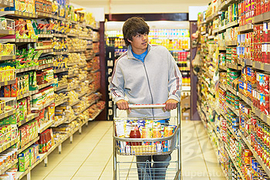In this camp, Megan and I focus on the daily, adult life skills that those who are not on the spectrum have learned by watching their parents and do now without thinking about. One of our first lessons on day one was on body odor and how wearing deodorant is so important to making and keeping friends and/or a girlfriend and getting and keeping a job. Along with this lesson we talked about the importance and process of brushing your teeth, washing your hair, combing your hair, how often you should get your hair cut, clean/unwrinkled/matching clothes, shaving, wearing a beard or other facial hair, etc. We incorporate an after lunch hygiene check where they reapply deordorant and brush their teeth and comb their hair if needed. I have always found that my teens in high school are usually most influenced by this lesson when I bring in the dating factor and how poor hygiene will negatively effect their chances.
Some other life skills that we work on are: budgeting, planning meals for a group/family each week, making a grocery list, we walk up to the local grocery store together where we are working on walking together as a group of friends, working on small talk and walking side by side. We look for sale items at the store and talk about safety skills regarding how much information we should be sharing with strangers as well as expected greetings while out in public. We have the campers pay for the items using cash.
Through our experiences, Chris, Megan and I have found that the majority of our teens are not active in the grocery shopping experience with their parents. Between the three of us, we have had many teen and adult clients who are not experienced with paying for items using cash, waiting for their change and checking for accuracy, understanding where/how to ask for specific items or assistance if needed, how to leave a tip and the list could go on.
This is why we feel it is so important to get out there and do these activities with our campers and clients. If you were to think of a typical 16 or 17 year old without autism, most would be able to run into a store, find what they need or ask someone for help, pay for the item and leave without too much of a struggle even if they don't do it often. Teens with high functioning autism are just as capable of the same experience! They just need to be exposed to this experience OFTEN, taught DIRECTLY each step of the process, and then forced to practice, practice, and practice in multiple stores for generalization!
Another challenge that Chris, Megan and I have found to be true more often than not is the lack of stamina that the teens with hfASD have for just about any physical or work related task. We are equating this to a lifestyle where they are focused on 1 or 2 activities that typically are sedentary and almost always involve technology in some form or another. Many times the three of us have made plans for a client or group and have had to adjust them in order to scaffold the task to build up their tolerance levels. Some specific examples of a lack of tolerance for physical and/or work related tasks have been: washing a car (only able to sustain attention and tolerance for 1/2 the car), going for a walk with a group to a destination, loading/unloading groceries, etc.
Besides the above, the following are life skills that many teens with hfASD have either never done or haven't done in years:
- Cook a meal for a group/family
- Use the stove
- Find food items in a store
- Use the oven
- Cut fruit or other items with a knife
- Wash (by hand) the dishes
- Clean up from start to finish after a meal
- Put dishes in the dishwashwer
- Put dishes away
- Choose leisure activities that do not involve technology
- Use deodorant
- Maintain a full hygiene list daily
- Independently pack their own lunch/breakfast
- Set an alarm to get themselves up in the morning
- Play board games with peers and/or family
- Play cards, do a puzzle
- Sit at a table together and have a family style meal (passing food, asking for others to pass, waiting to eat until everyone sits down, waiting to get up until all are finished or they ask to be excused, making small talk, eating quietly, feet down on the floor, if you need something when you are at the table...you get up and get it yourself instead of waiting for staff or someone else to get it for you!)
- Know their full address
- Phone number/parents phone number
- Order at a restaurant
- Pay for their own meal with cash and figure out the tip
Parents, teachers, caregivers, and social coaches...PLEASE work on these skills now! Teens with hfASD are intelligent and are very capable of holding jobs and being independent as adults. Without working on these life skills would be a detriment to their success at functional independence. Being capable of doing them also is a huge confidence booster, helping them make and keep friendships which is what they are all desperate for at this age. I tell my teens all the time, even just for friendship that you have to make yourself attractive; that means being able to take care of yourself and being comfortable with participating in many activities instead of just one or two.
I have attached an article, Daily living skills prove more important than autism symptoms, language or IQ when it comes to employment and life satisfaction. I can imagine that reading this is hard for some; and I know that some are ahead of the game and have been tackling these skills for years with their child, and then there are some that just needed a reminder. Parents, caregivers, teachers, DON'T WAIT! Step it up now and start incorporating life skills training into your daily schedules so our teens with hfASD can grow into gainfully employed, fully independent adults!
Happy Summer!!
Sabra Evans


